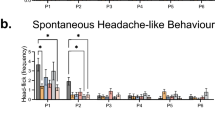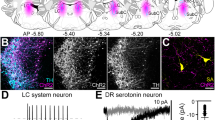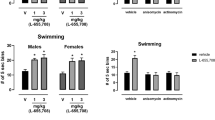Abstract
PREVIOUS studies have indicated that the central excitant action of d-amphetamine is the result of direct activation of the brain stem reticular formation1,2. It has been suggested that amphetamine acts on the central nervous system by releasing noradrenaline from presynaptic sites3; and in fact noradrenaline release follows intracisternal administration of d-amphetamine4, and histochemical studies have demonstrated the existence of nerve terminals containing noradrenaline in the brain stem reticular formation5. Studies of the effects of iontophoretically applied noradrenaline to single neurones in the cat brain stem have shown that both excitation and inhibition can occur6, and that these actions of noradrenaline are closely mimicked by iontophoretically applied d-amphetamine7. This could result either from release of endogenous noradrenaline or from a direct effect of amphetamine. Pretreatment with reserpine reduces concentrations of brain amines; the actions of iontophoretically applied l-noradrenaline (l-NA) and d-amphetamine to single neurones in the brain stem have therefore been compared in reserpinized and untreated rats.
This is a preview of subscription content, access via your institution
Access options
Subscribe to this journal
Receive 51 print issues and online access
$199.00 per year
only $3.90 per issue
Buy this article
- Purchase on Springer Link
- Instant access to full article PDF
Prices may be subject to local taxes which are calculated during checkout
Similar content being viewed by others
References
Bradley, P. B., and Elkes, J., Brain, 80, 77 (1957).
Bradley, P. B., and Key, B. J., Electroenceph. Clin. Neurophysiol., 10, 97 (1958).
Carlsson, A., Lindqvist, M., Dahlström, A., Fuxe, K., and Masuoka, D., J. Pharm. Pharmacol., 17, 521 (1965).
Carr, L. A., and Moore, K. E., Biochem. Pharmacol., 19, 2361 (1970).
Fuxe, K., Acta Physiol. Scand., 64, Supp. 247 (1965).
Bradley, P. B., and Wolstencroft, J. H., Nature, 196, 840, 873 (1962).
Bradley, P. B., Hösli, L., and Wolstencroft, J. H., quoted by Bradley, P. B., Intern. Rev. Biol., 11, 1 (1968).
Bradley, P. B., and Wolstencroft, J. H., J. Physiol., 170, 2P (1964).
Bradley, P. B., and Candy, J. M., Brit. J. Pharmacol., 40, 194 (1970).
Boakes, R. J., Bradley, P. B., Brookes, N., and Wolstencroft, J. H., Brit. J. Pharmacol., 32, 417P (1968).
Boakes, R. J., Bradley, P. B., Brookes, N., Candy, J. M., and Wolstencroft, J. H., Brit. J. Pharmacol. (in the press).
Hösli, L., Tebēcis, A. K., and Schönwetter, H. P., Experientia, 26, 680 (1970).
Johnson, E. S., Roberts, M. H. T., and Straughan, D. W., J. Physiol., 203, 261 (1969).
Fleming, W. W., and Trendelenburg, U., J. Pharmacol. Exp. Ther., 133, 41 (1961).
Carlsson, A., Prog. Brain Res., 8, 9 (1964).
Author information
Authors and Affiliations
Rights and permissions
About this article
Cite this article
BOAKES, R., BRADLEY, P. & CANDY, J. Abolition of the Response of Brain Stem Neurones to Iontophoretically Applied d-Amphetamine by Reserpine. Nature 229, 496–498 (1971). https://doi.org/10.1038/229496a0
Received:
Issue Date:
DOI: https://doi.org/10.1038/229496a0
Comments
By submitting a comment you agree to abide by our Terms and Community Guidelines. If you find something abusive or that does not comply with our terms or guidelines please flag it as inappropriate.



